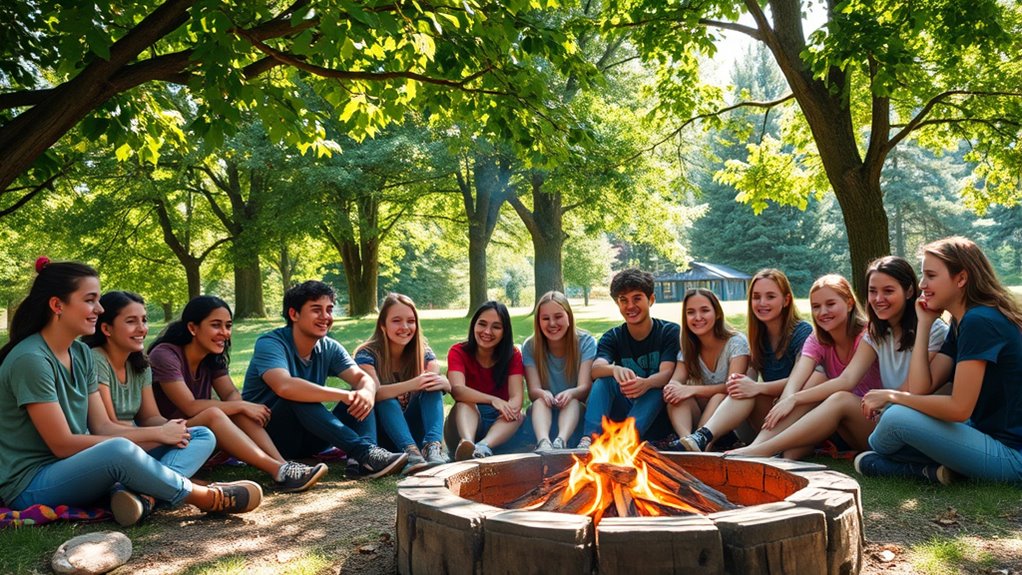Engaging youth in church through groups and camps helps you build strong friendships, deepen faith, and feel part of a caring community. These activities foster trust, encourage leadership, and give young people meaningful opportunities to serve others. They also strengthen family bonds and celebrate diversity, creating safe spaces for growth. If you want to discover how these experiences can transform your church and youth involvement, there’s more to explore below.
Key Takeaways
- Youth groups and camps foster community, friendship, and family bonds through shared activities and intergenerational dialogue.
- They promote spiritual growth by providing opportunities for worship, Bible study, prayer, and reflection.
- These programs develop leadership skills and responsibility through service projects and youth-led initiatives.
- Engaging youth in camps and groups encourages active participation, responsibility, and a sense of belonging within the church.
- They create a safe, inclusive environment that nurtures emotional well-being, mentorship, and cultural diversity.
Building Community and Friendships

Have you ever wondered why young people feel more connected and supported in church communities? It’s because activities like peer mentoring and social events foster genuine friendships and a sense of belonging. When you participate in peer mentoring, you build trust and learn from others’ experiences, making the church feel like a safe space. Social activities, such as youth nights or group outings, create opportunities to connect outside of formal services. These interactions help break down barriers and encourage open communication. As you engage in these community-building efforts, you’ll notice a stronger bond among peers, making your faith journey more meaningful. Building friendships through these activities nurtures a supportive environment where everyone feels valued and motivated to grow together. Additionally, implementing consistent messaging can reinforce shared values and strengthen the overall community atmosphere. Moreover, fostering a sense of community can significantly improve engagement and participation among youth members, especially when activities incorporate elements of imaginative play that encourage creativity and emotional expression. Incorporating opportunities for interactive activities can further enhance group cohesion and make the experience more enjoyable. Recognizing the importance of developmental stages ensures activities are age-appropriate and effectively support emotional and social growth.
Developing Faith and Spiritual Growth

Developing faith and spiritual growth is an essential part of your journey in the church community. Participating in activities like music ministry allows you to express your faith through worship and connect with others who share your beliefs. Engaging in prayer retreats offers focused time for reflection, renewal, and deepening your relationship with God. These experiences help you understand spiritual principles more clearly and strengthen your trust in faith. By actively involving yourself in worship services, Bible studies, and retreats, you create a foundation for ongoing spiritual growth. Consistent involvement in these practices nurtures your faith, helps you navigate life’s challenges with spiritual resilience, and keeps you connected to the church community’s supportive environment. Engaging in spiritual practices like meditation and service projects can further deepen your faith journey and foster personal spiritual development.
Providing Safe and Supportive Environments

Creating a safe and supportive environment is essential for youth engagement in the church, as it encourages young people to participate fully and confidently. When mental health is prioritized, teens feel more comfortable sharing their struggles and seeking help. Peer support plays a pivotal role, fostering a sense of belonging and understanding. To build this environment, consider implementing policies that promote respect and confidentiality. Here’s a simple overview:
| Action | Key Benefit | Example |
|---|---|---|
| Open dialogue sessions | Mental health awareness | Regular check-ins |
| Trained youth leaders | Peer support and guidance | Mentoring programs |
| Clear anti-bullying policies | Safe space for everyone | Zero-tolerance stance |
| Inclusive activities | Foster belonging | Diverse group events |
| Confidential resources | Emotional safety | Counseling referrals |
This approach helps create a nurturing space where youth thrive. Recognizing the importance of plant care techniques can serve as a metaphor for nurturing young minds in a supportive environment. Additionally, understanding effective communication strategies can further enhance the sense of trust and openness among youth members. Incorporating mentoring programs can also significantly strengthen peer relationships and promote positive development. Developing trust-building activities can further facilitate open dialogue and connection among youth, especially when informed by emerging AI entertainment tools that can support engagement and interaction.
Cultivating Leadership Skills and Responsibility

Empowering youth to take on leadership roles is essential for fostering a sense of responsibility and purpose within the church community. When you focus on youth leadership, you’re helping young members develop crucial skills through responsibility training. To effectively cultivate leadership, consider these steps:
- Provide opportunities for youth to lead small groups or projects.
- Offer mentorship programs that build confidence and guidance.
- Encourage decision-making roles in church activities and planning.
- Incorporate spiritual messages in dreams and sustainable practices into youth programs to promote awareness of environmental stewardship.
Creating Opportunities for Service and Outreach

To foster meaningful youth involvement, you can organize community events that invite participation and build connections. Partnering with local charities gives young people a chance to serve others and learn compassion firsthand. Encouraging youth-led projects empowers them to take ownership and make a real impact in outreach efforts. Incorporating interactive twists can also make activities more engaging and memorable for youth. Additionally, understanding the tax implications of different activities can help in planning events that maximize benefits for the community and the youth involved. Planning activities with proper material quality and safety measures ensures that youth projects are sustainable and effective, similar to best practices in DIY candle making, which emphasizes safety, proper materials, and thoughtful planning, can also serve as a valuable model for youth projects. Recognizing the influence of family background on personal development is crucial for creating supportive environments that nurture leadership and community spirit.
Organize Community Events
Organizing community events provides a vital opportunity for youth to actively serve and outreach within their neighborhoods. By engaging in event planning, you can create innovative activities that resonate with your community. To make your events successful, consider these steps:
- Brainstorm creative ideas that address local needs or interests.
- Collaborate with peers to share responsibilities and bring diverse skills.
- Promote the event through social media and word-of-mouth to maximize participation.
- Incorporate a cozy ambiance into your events by using warm lighting and inviting decor to make attendees feel comfortable and welcomed.
- Regularly updating your content can improve your topical authority, making your community events more visible and impactful.
- Applying effective financial management strategies ensures your resources are used wisely and your events remain sustainable.
Focusing on innovative activities keeps the community engaged and demonstrates your group’s commitment. These events not only foster teamwork among youth but also build meaningful connections with neighbors. When you organize purposeful community events, you turn outreach into a fun, impactful experience that encourages ongoing service.
Partner With Local Charities
Partnering with local charities extends the impact of your community events by connecting youth directly with ongoing service opportunities. By forming charity partnerships, you give your youth meaningful chances to participate in volunteering opportunities that make a real difference. These collaborations expose young people to diverse causes and help them develop a sense of compassion and responsibility. When you involve your youth in charity work, they see firsthand how their efforts contribute to the community’s well-being. Additionally, working with local charities can introduce your group to new networks and resources, broadening their engagement. Incorporating content related to cultural celebrations can also foster pride and unity within your youth group, enriching their experience and sense of belonging. Engaging in volunteer activities can provide practical experiences that develop leadership skills and teamwork. Overall, these partnerships foster a culture of service, encouraging youth to become active, compassionate members of your church’s wider community.
Encourage Youth-Led Projects
Encouraging youth-led projects empowers young people to take ownership of service and outreach efforts within your church. When you support youth-led initiatives, you foster leadership, creativity, and a sense of responsibility. Here are three ways to do this effectively:
- Create platforms for youth voice—allow them to plan and execute outreach activities.
- Implement peer mentorship programs—pair older youth with younger members to build confidence and skills.
- Offer leadership training—equip youth with tools to lead projects confidently and sustainably.
Strengthening Family and Church Connections

Building strong faith bonds within families helps your youth stay connected and motivated in their spiritual journey. When families and the church work together, the community becomes more united and supportive. How can you foster deeper relationships that strengthen both family faith and church unity?
Family Faith Bonds
Strengthening family faith bonds is essential for fostering deeper connections between family members and the church community. You can do this through:
- Engaging in intergenerational dialogue, where different age groups share faith stories and experiences, enriching everyone’s understanding.
- Participating regularly in family worship, creating routines that center your faith and encourage spiritual growth.
- Inviting youth to take active roles in family faith activities, making them feel valued and involved.
These practices help bridge generational gaps, deepen trust, and reinforce shared beliefs. When family members connect through meaningful conversations and shared worship, it creates a strong spiritual foundation. This unity strengthens the overall church community and helps youth develop a lasting faith journey.
Church Community Unity
How can your church foster a sense of unity that truly connects families and individuals? One effective way is by encouraging intergenerational dialogue, where members of different ages share experiences and perspectives. This creates a stronger bond and deepens understanding across generations. Cultural integration also plays a crucial role; embracing diverse backgrounds helps everyone feel valued and included. Organize activities that promote cross-generational interactions, such as shared meals, service projects, or discussion groups. When families see their church as a community that celebrates unity through open communication and cultural respect, they’ll feel more connected. Strengthening these relationships fosters a supportive environment where youth and adults grow together, building lasting bonds that reinforce the church’s sense of community and shared purpose.
Frequently Asked Questions
How Can Youth Groups Adapt to Diverse Interests and Backgrounds?
To adapt to diverse interests and backgrounds, you should prioritize cultural inclusivity and interest diversification within your youth group. Offer varied activities that reflect different cultures and encourage open dialogue. Listen to what your youth want, and tailor programs to meet those needs. By creating an inclusive environment where everyone feels valued, you’ll foster stronger connections and guarantee all young people find a sense of belonging.
What Are Effective Ways to Measure Youth Engagement Success?
To measure youth engagement success, you should track social media activity and analyze feedback surveys. Social media helps you see how often youth participate and interact with your content, indicating involvement. Feedback surveys provide direct insights into their experiences and satisfaction levels. Combining these tools gives you a clear picture of engagement, allowing you to adjust your strategies for better connection and growth within your youth community.
How Do Camps Support Long-Term Spiritual Development?
Think of camps as a campfire where bonds are kindled and spirits warmed. They support long-term spiritual development by creating a space for meaningful connections, spiritual milestones, and personal growth. Through campfire bonding activities, you help youth build resilience and faith that last beyond the camp. These experiences plant seeds of devotion, nurturing lifelong spiritual journeys that grow stronger with each shared moment and milestone achieved.
What Role Do Parents Play in Youth Group Participation?
You play a crucial role in your child’s youth group participation through parental influence and family involvement. By showing interest, encouraging their faith journey, and attending events together, you reinforce their spiritual growth. Your support helps them feel connected and valued within the church community. Active engagement from you fosters a positive environment, making youth group experiences meaningful and inspiring, and ultimately strengthening their long-term commitment to faith.
How Can Churches Sustain Youth Involvement Over Time?
To sustain youth involvement over time, you should foster intergenerational dialogue and create meaningful faith-based outreach. Engage older members to mentor and connect with youth, making them feel valued. Keep activities relevant and inviting, encouraging feedback. By building relationships across ages and emphasizing shared faith, you help youth see their importance in the church community, inspiring ongoing participation and spiritual growth.
Conclusion
When you invest in youth groups and camps, you’re planting seeds of connection and growth that flourish over time. These experiences gently nurture their faith, friendships, and sense of purpose, creating a warm, welcoming space for their journey. By encouraging their involvement, you help them bloom into confident, compassionate individuals who bring light to your church community. Ultimately, your support helps them craft a bright and meaningful path, enriching everyone’s spiritual voyage.










